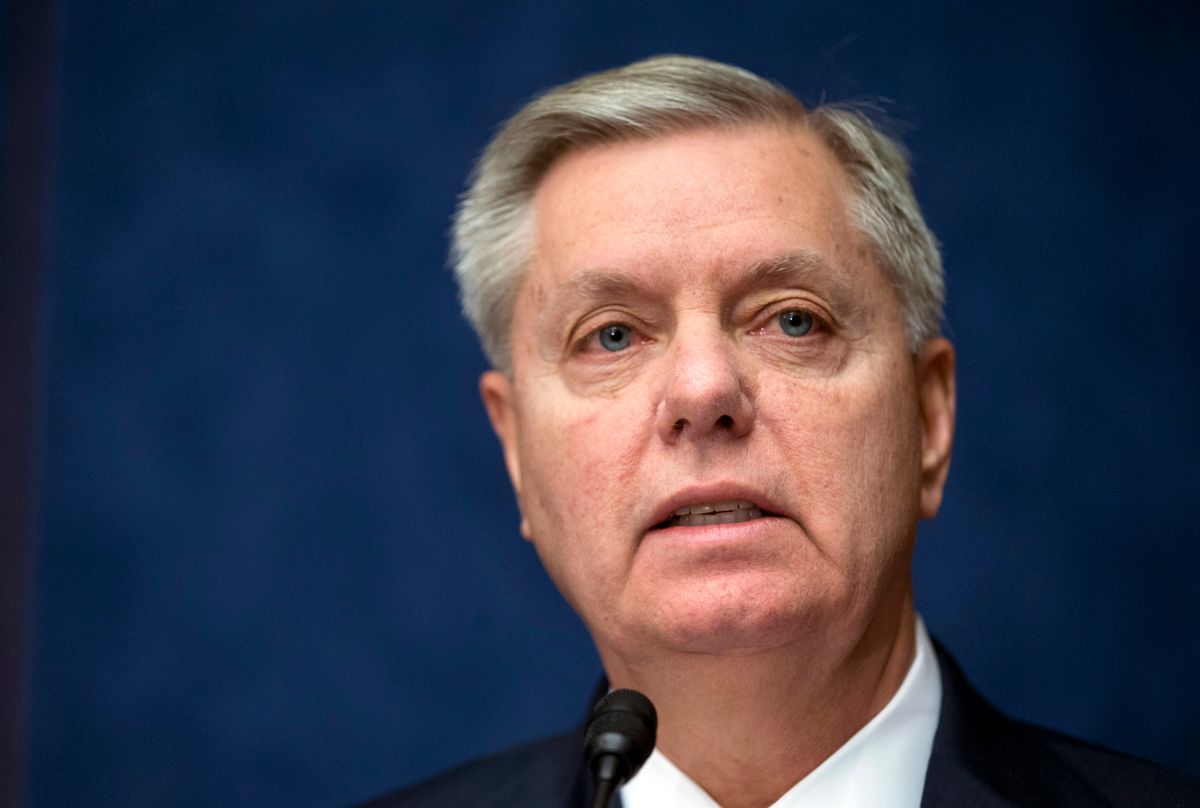Welcome to the playing field Sen. Lindsey Graham, the one Republican presidential candidate who thinks "the world is falling apart" and who includes climate change as one of the reasons why. Slate's Eric Holthaus, in calling for Graham's candidacy in March, argued he "may be the only politician who can stop global warming." Writing in the New Republic today, Rebecca Leber called him "a Republican that environmentalists can love." Politico frets, meanwhile, that he's "too green for the GOP," which is most likely to be true: Graham's acceptance of climate change, among other moderate positions, makes him a long shot in the already crowded GOP field.
And if this is the best the Republican party can give environmentalists, well, it's kind of embarrassing how far we've been forced to lower our standards.
Graham certainly gets infinite credit for acknowledging the scientific reality of climate change. "I can't imagine a nominee for either major party arguing to the public that climate change is not real and man is not contributing to it," he said all the way back in 2007. "If they take that position, the public is going to really question their judgment."
It's a sentiment that may speak to "the nearly 50 percent of Republicans who believe that we ought to act to address climate change,” Daniel Weiss, senior vice president for campaigns at the League of Conservation Voters, pointed out to Politico. “The vast majority of the potential Republican candidates are on record as climate-science deniers, thereby catering to a small but vocal part of the Republican electorate.”
But his position -- bold for a Republicans, not at all controversial for anyone in touch with reality -- says less about Graham than it does about the dismal state of the current GOP field of dodgers, skeptics and flat-out deniers whose judgement is indeed questionable, to say the very least.
Graham knows his fellow Republican leaders have issues: in March, he suggested the GOP really needs to do some "soul-searching" on its non-existent environmental platform. "I'd like to have a debate within the party," he explained in a speech at the Council on Foreign Relations. "Can you say that climate change is a scientifically sound phenomenon? But can you reject the idea you have to destroy the economy to solve the problem, is sort of where I'll be taking this debate."
That second point will be key -- fear of the economic implications of climate action, after all, is likely the real reason behind most Republican candidates' rejection of the science -- and let's face it, it'll be the harder sell. If the Republican party has its come-to-Jesus moment and decides that trying to reduce greenhouse gas emissions isn't worth the cost (which is an argument many have already made), then it's not going to the world a lot of good. At a time when the conservative analysis holds that "substantial and sustained" reductions in emissions are required to avoid the possibility of climate catastrophe, being square with the science isn't going to be enough.
While again, Graham gets Green cred for proposing an honest-to-goodness debate that doesn't attempt to rewrite science, he hasn't exactly come out with guns blazing for the environment. His lifetime Senate score from the League of Conservation Voters is a measly 11 percent, meaning he's come out against pro-environmental measures far more often than he's supported them. He's pro-Keystone XL, anti-clean energy tax credits, and has voted to prevent the EPA from being able to regulate greenhouse gases. And he's not above resorting to petty tactics even on this critical issue: in 2010, he threw his own climate bill under the bus.
And about the science, well, it's not even clear that Graham's completely chosen a side himself. In explaining his decision to vote against the bill he helped author, he declared that the science of global warming has been "oversold" and is "in question." When pressed by reporter Kate Sheppard, he said, "I do believe the environmental benefit of a low carbon economy is worth the Republican party's time and attention" -- but he got there by way of some tortured reasoning that suggests he's not nearly as certain about fossil fuels' threat as, for the sake of public health, national security and everything else, a president of the United States would need to be.

Shares